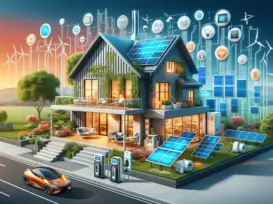Grus Home Energy - Smart Metering
Revolutionizing Utility Management: The Rise of Smart Metering Technology
Revolutionizing Utility Management: The Rise of Smart Metering Technology
As we stride further into the 21st century, the way we monitor and manage our utility consumption is undergoing a radical transformation. At the heart of this change lies the advent of smart metering technology—an innovation that has the potential to revolutionize not just how we track energy and water usage, but also how we think about and engage with our utilities.
Smart meters are electronic devices that record the consumption of electric energy, gas, or water in intervals of an hour or less and communicate that information back to the utility provider for monitoring and billing purposes. They are the next generation of utility meters, replacing the traditional analog meters that required manual reading. The real-time data collected by smart meters allows for more accurate billing, and it also provides consumers and utility companies with detailed insights into usage patterns.
The deployment of smart metering systems is motivated by several compelling benefits. For consumers, smart meters mean the end of estimated billing; charges are based on actual usage rather than projected consumption. This could lead to cost savings as consumers become more aware of their consumption habits and are incentivized to reduce their usage during peak times. Demand-response programs encourage this behavior by offering lower rates during off-peak hours, helping to balance the load on the grid and prevent blackouts.
From an environmental perspective, smart metering is a crucial component in the development of smart grids, which are vital for the integration of renewable energy sources. By providing real-time data on energy demand, smart meters enable the grid to respond dynamically to changes in supply and demand, thus facilitating the use of intermittent renewable energy sources like wind and solar power. This can lead to a significant reduction in carbon emissions as reliance on fossil fuels decreases.
Utilities benefit from the enhanced operational efficiencies that smart meters provide. The ability to monitor the grid in real time helps identify and isolate outages more quickly, reducing downtime and improving service reliability. Moreover, the rich data harvested from smart meters supports predictive maintenance, allowing utilities to address potential issues before they cause problems.
There are, however, challenges that accompany the widespread implementation of smart metering. Privacy concerns arise as smart meters can reveal detailed information about a household’s daily routines. Security is another significant concern; the meters must be protected against hacking to ensure both the privacy of consumers and the integrity of the grid. Additionally, the upfront cost of installing smart metering infrastructure can be quite high, although the long-term savings and operational benefits typically offset these initial expenditures.
Despite these challenges, the trend towards smart metering is clear. Countries around the world are rolling out these systems at an increasing rate, driven by the benefits of improved efficiency, cost savings, and environmental gains. As the technology continues to mature and the costs of implementation decrease, it is likely that smart metering will become the standard method of utility management across the globe.
In conclusion, smart metering technology is more than just an upgrade to our utility meters; it is a fundamental shift towards a more informed, efficient, and sustainable consumption of energy and water resources. The data-driven insights provided by smart meters empower consumers, enhance grid management, and pave the way for a greener future. As this technology continues to evolve and expand, it holds the promise of a smarter, more connected, and more responsible world.
Blog, Smart Home Automation , February 17, 2024 , Electric Vehicle (EV) Charging, Energy Consumption Analysis, Energy Management, Energy Savings and Profit, Heat Pumps Optimization, Home Battery Storage, Renewable Energy Technologies, Smart Grid Technology, Smart Metering, Smart Metering Systems, Solar Panels Efficiency, Sustainability in Home Energy
©2025 All Rights Reserved. Grus IoT Co.,Ltd.
